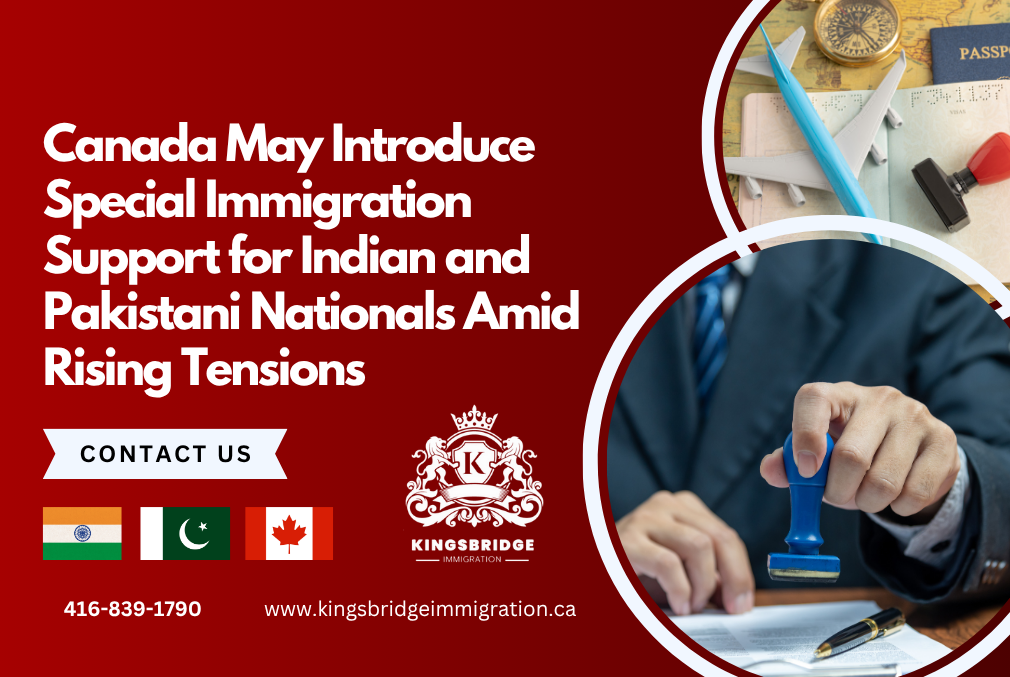
Amid escalating tensions between India and Pakistan, the Canadian government is reportedly considering targeted immigration support for Indian and Pakistani residents currently in Canada.
The possible move comes as Canada’s South Asian community expresses growing concern over the safety of loved ones, immigration delays, and disrupted travel following the latest spike in regional hostilities.
Canada has a history of extending immigration relief to nationals of countries in crisis. In recent weeks, the federal government issued travel advisories for both India and Pakistan in light of ongoing diplomatic and security issues.
The current India-Pakistan flare-up stems from a deadly attack in Indian-administered Kashmir in April 2025, which resulted in 26 deaths, including tourists. India blames Pakistan for harboring the attackers—an allegation that Pakistan strongly denies.
In retaliation, both nations have enforced strict measures: recalling diplomats, suspending bilateral agreements (like the Indus Waters Treaty), banning trade, and cancelling visas. The closure of the Attari-Wagah border and flight restrictions have further disrupted cross-border movement, leaving many families divided.
Canada is home to about 1.7 million people of Indian origin and over 300,000 people of Pakistani descent. In provinces such as British Columbia and Ontario, where these communities are concentrated, there has been a collective call for peace and proactive Canadian government support.
Possible Immigration Responses Canada Could Announce
Although no formal program has been declared, based on past humanitarian actions, Canada may implement temporary immigration policies such as:
Permit Extensions: Automatic or simplified extensions for visitors, international students, and workers from India and Pakistan who cannot return home due to travel restrictions or safety issues.
Faster Family Reunification: Prioritized processing of sponsorship applications for close family members impacted by visa or travel bans.
Humanitarian Pathways: Special permits or residency options for those facing hardship or risk due to the conflict, especially those with family ties on both sides of the border.
Support for Asylum Seekers: Streamlined pathways for Indian and Pakistani nationals who may seek refuge citing political or safety concerns.
Enhanced Consular Services: Expanded staffing and resources at Canadian missions abroad to address increased inquiries and assist affected applicants.
These potential actions would primarily benefit students, workers, and families currently in Canada. With over 400,000 Indian students alone, any uncertainty surrounding study permits or post-graduation work permits could have significant consequences.
Past Examples of Canada’s Humanitarian Immigration Responses
Canada has previously rolled out emergency immigration programs in response to international crises:
1971-72: Provided refuge to over 5,000 people from East Pakistan (now Bangladesh) during the liberation war.
1999: Welcomed more than 7,000 Kosovars through expedited immigration streams during the Kosovo conflict.
2015: Resettled 25,000+ Syrian refugees via government and private sponsorships.
2022: Offered temporary visas, work permits, and family reunification under CUAET to over 200,000 Ukrainians fleeing the war.
2023-24: Assisted over 1,500 Sudanese with temporary status, fee waivers, and faster family reunification processing due to the civil conflict.
These past measures show Canada’s ability to quickly adapt immigration policies in response to urgent humanitarian needs.
Voices from the Community
South Asian community leaders in Canada are cautiously optimistic.
“We need reassurance for our families and stability in our immigration status,” said Haroon Khan from the Pakistan-Canada Association in Vancouver. “Any action to ease uncertainty is welcome, but diplomacy must also be part of the solution.”
International students have voiced concern over their future in Canada. Simran, a student from Punjab, told CBC News: “The tensions back home might affect my study permit extension. That’s a big worry.”
Vinay Sharma of the Vedic Hindu Cultural Society emphasized community harmony: “In Canada, we live as one family. We hope the government takes care of our needs while advocating for peace in South Asia.”
What’s Next?
While the Canadian government has not officially announced new immigration measures, advocacy from the South Asian community continues to build momentum. If implemented, such steps could bring timely relief and reflect Canada’s commitment to humanitarian values.
Stay tuned for further updates as the government monitors the situation and considers its next steps.